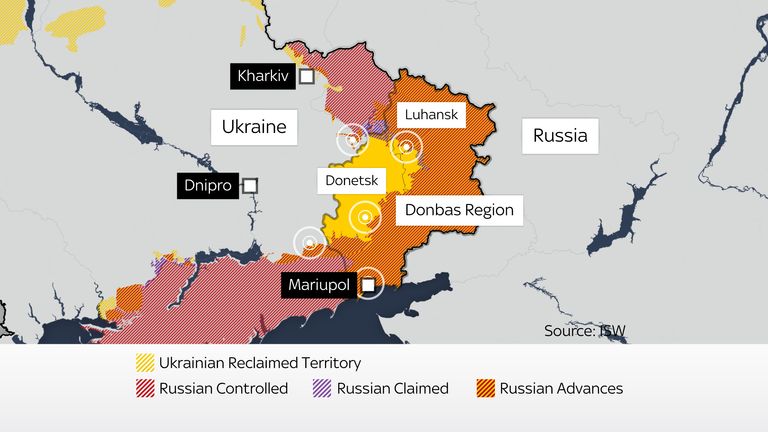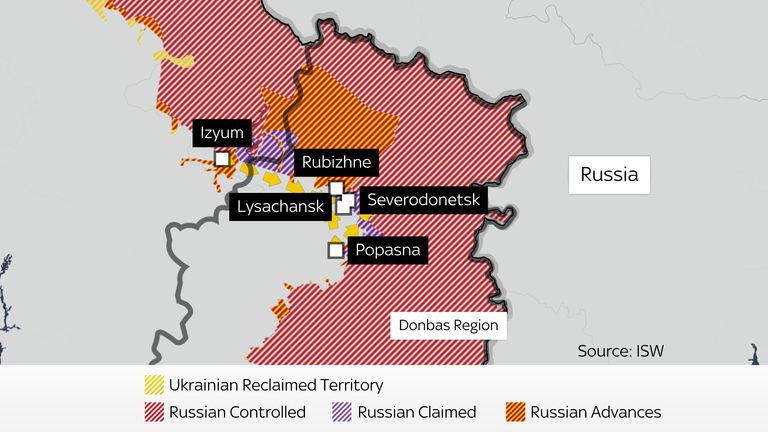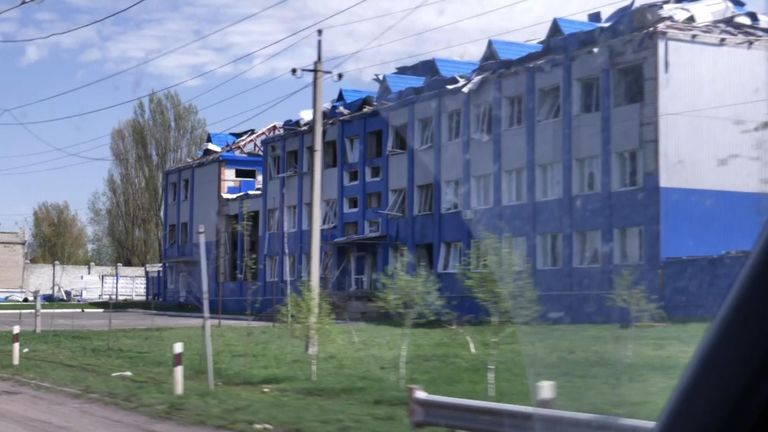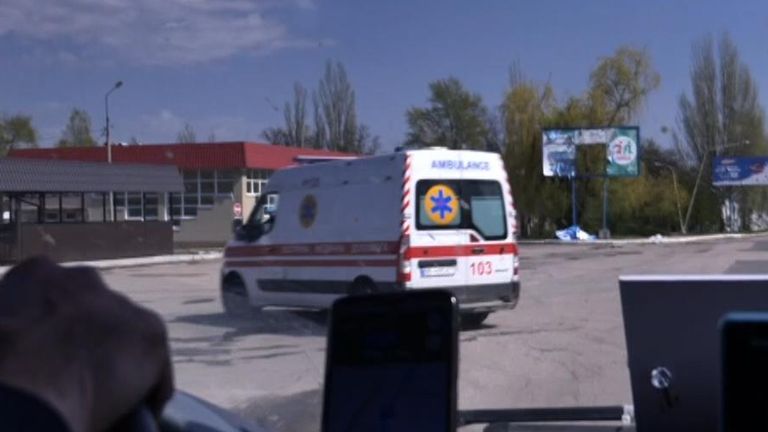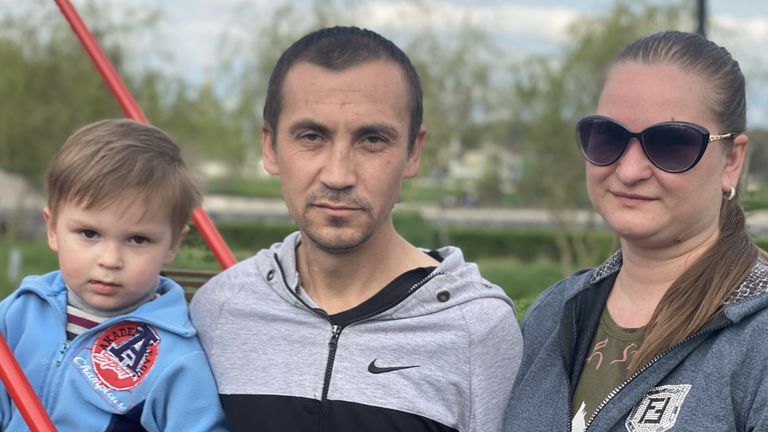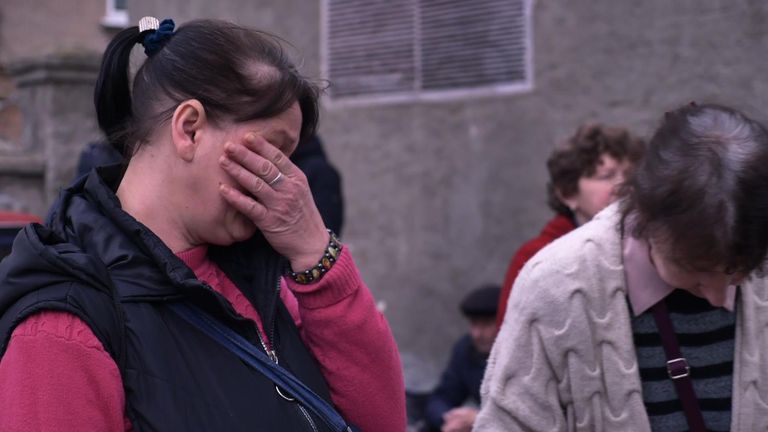[ad_1]
The Russians have been trying to take the Ukrainian city of Lysychansk for weeks. Signs of the back-and-forth in this battle are everywhere.
We pass the shells of bombed out buildings. The place feels deserted.
The population here was 100,000 before the invasion. Just a fraction of them are left now.
There are few cars around. Our escort, an ambulance, is easy to find in the empty streets.
Mykola lytvyn is at the wheel. The 56-year-old is one of a small team of medics still operating inside this frontline city.
The importance of Lysychansk
Lysychansk is put into an alarming context by the daily battlefield updates published by the Ukrainians, the Russians and western intelligence agencies.
The city is surrounded on three sides by Russian forces pushing towards it.
To the north they are about 20 miles away, pushing south. To the south, they are a similar distance away, pushing north.
And to the east, they are just a few miles away, fighting the Ukrainians in the city of Severodonetsk. Just a river splits the two cities.
‘15,000 Russian troops killed’ since Ukraine invasion; Russia ‘trying to destroy supply routes’ – live updates
The Russians are building pontoon bridges to the north on land they control.
Strategically, if the Russians can take Severodonetsk and Lysychansk then they can unite their northern and southern divisions for their push west.
Shelling every hour
Within just a few minutes of meeting Mykola we hear the thuds.
“It’s far away, it’s not coming here,” he says as artillery impacts a mile or so away.
Then a much closer thud. “Now you can hear – this is here. Now we have to take care,” he says.
It’s been a heavy morning: “After 10am they started (shelling). In the morning, they were shelling from the side of Popasna and we hear stuff from the direction of Rubizhne and Kremina. There was heavy fighting. Here from 10am there was intense shelling, so we were ducking.”
The more shelling there is, the more likely it is that he and the team must venture out.
“We are taking the risk to go out if there are casualties. Many people left the city,” he says.
The towns he mentions – Popasna, Rubizhne, Kremina – are places which surround Lysychansk. Kremina fell to the Russians overnight on Sunday.
“When the Russians enter the city, it’ll be too late to evacuate,” he says. “We will stay here as long as we can.”
As he speaks, he chuckles with a nonchalance that’s reflective, perhaps, of a man who’s immune to what he sees, or pretends to be.
It’s not shared by all the team. Sitting in the corner, a younger medic who looks utterly exhausted.
“We are working around the clock. We have a limited number of people to help right now. Some people here are working every day, those who live here are working every day…” he says.
Another in the team explains how they almost lost a colleague a few days ago.
She went to buy bread, her friend says, and the shelling started. She lost her leg.
One road out
There is just one Ukrainian-held road in and out of Lysychansk now.
We pass through makeshift fortifications – chicanes made from piles of earth removed from trenches which line the fields, and trees chopped down. It’s all a rudimentary attempt to slow any Russian advance.
Driving west, away from the front, we pass Ladas from the last century, loaded with people and belongings.
Depopulating the east is part of the Russian strategy and it’s working.
Everywhere along this part of the Donbas there are convoys heading west.
The drive from Lysychansk to the next town, Bakhmut, takes about an hour.
There, in the peace of a park that feels a million miles from the frontline, we found Igor, his wife Marina, their little boy Artum.
They are from the town of Popasna. It’s just 18 miles to the east, due south of Lysychansk, and it’s been the centre of heavy fighting for weeks.
“The shelling was very intense there. Our boy took it so badly,” Igor says.
“He was screaming during the night; he was crying. We were living in darkness constantly. We had candles but everything ran out. The city doesn’t have electricity, gas or water. The buildings are destroyed.”
This is the first day three-year-old Artum has been out since they escaped three weeks ago.
“But he’s still afraid,” his mother Marina says. “During the night he breaks down. He is screaming and crying at night. But it’s much better here than it was in Popasna.”
The exodus
The people who have streamed across Ukraine, across Europe, they are from places like Lysychansk, Popasna, Bakhmut. Many more will follow.
In the central square, we came across a group of families who had just got out.
“Popasna city is completely destroyed. We have nowhere to go back. We are homeless and poor people,” Olga Bondareva says.
“My mother is 76-years old. We had everything, now we have nothing. Nothing. No buildings, nothing. The city is completely destroyed. The city is flattened. When we were evacuating it was terrifying.
“We want to get as far as possible to raise our grandchild in peace. We suffered a lot. When the siren was on everyone is shaking, our heart is beating fast.”
Every story is equally grim. And they come one after another.
Follow the Daily podcast on Apple Podcasts, Google Podcasts, Spotify, Spreaker
A woman approaches with the story of her missing son. His name is Ruslan and he’s 41 years old. She holds a photo of him on her phone.
“He left the bunker to check on the apartment and he disappeared. I have no idea where he is since the 11th of April. I waited and waited for him. I thought he would come. I thought he was hiding somewhere in the basement but he didn’t come. Maybe somebody knows something about him?”
Just before the bus pulls away for the journey further west, two sisters embrace.
One will take the bus. The other will stay behind to search for her missing husband. He is somewhere under the rubble in Popasna.
[ad_2]


